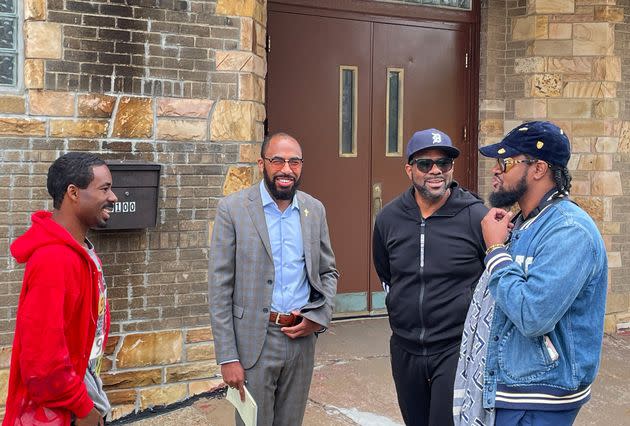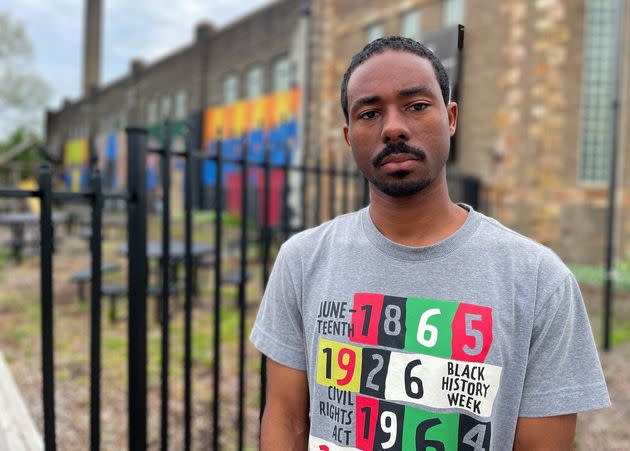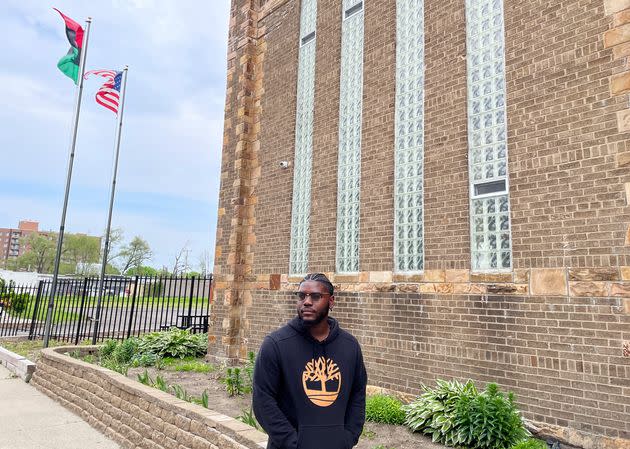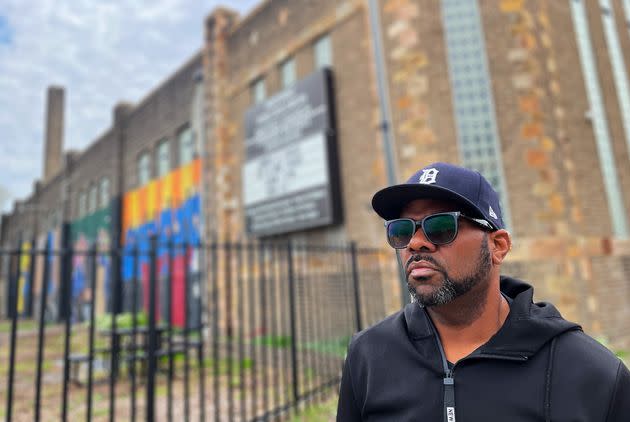Should Joe Biden Really Be Worried About Black Voters?
This article is part of HuffPost’s biweekly politics newsletter. Click here to subscribe.
DETROIT ― President Joe Biden plans to address an NAACP gala dinner here on Sunday night, following a week of outreach to Black voters that has included a speech at the National Museum of African American History and Culture and multiple interviews with media outlets that target Black audiences. He’ll be coming here directly from Atlanta, where he plans to meet with Black voters before giving the commencement address at Morehouse, a historically Black men’s college.
Officially, the impetus for all of this is the 70th anniversary of Brown v. Board of Education, the landmark Supreme Court decision striking down school segregation and its toxic principle of “separate but equal.”
Unofficially? Biden is on a mission to shore up support among what has long been one of the Democratic Party’s most loyal constituencies.
He may have some serious work to do.
If you are a left-leaning voter who follows politics closely, then you were probably gnashing your teeth about a New York Times/Siena College poll of six swing states that came out Monday. And it wasn’t just because the poll showed Biden trailing former President Donald Trump in five of them.
In that poll, Trump got more than 20% of the Black vote, which would be a higher share than any Republican presidential candidate has gotten since the 1960s. And it wasn’t some kind of outlier. Polls have been picking up similar results for months.
Those less favorable results would still leave Biden with the vast majority of Black voters. The problem is that it will be difficult for Biden to win if he can’t get the kind of backing from Black voters he got in 2020, when his support among them was above 90%, according to a Pew Research study of the electorate.
Then there’s the question of turnout. A sharp drop in Black turnout in 2016 was a critical factor in Hillary Clinton’s loss, especially in states like Michigan, where Trump’s winning margin was just 11,000 votes. The same thing could happen to Biden in 2024.

The election is still more than five months away, and the polls could be flat-out wrong. (Really!) But the evidence of depressed enthusiasm among Black voters at this point is too strong to dismiss, which is why this week I reached out to one of my contacts in Michigan, Charles Williams, for some insights.
Williams is the young pastor of a storied Detroit church, a veteran of progressive political causes and chair of Michigan’s chapter for the National Action Network. At my request, he gathered a handful of politically active voters from the community for me to talk to.
It wasn’t a formal focus group. And 90 minutes of conversation isn’t enough to reveal essential truths about the state of American politics. But I did pick up on a handful of themes that resonated with what the polls are showing ― and, to some extent, with what I heard from local political organizers I contacted afterwards.
The themes those voters discussed would certainly help explain why Biden hasn’t yet generated more enthusiasm. They may also offer some hints about how Biden could still reach ambivalent Black voters before Election Day.
Recognizing Accomplishments, Maybe Not Feeling Them
We met at Williams’ church, the King Solomon Baptist Church on Detroit’s west side, in a small conference room lined with Civil Rights posters.
The group of four Williams assembled were all men under 40, the very category of Black voters that the pollsters say is least enthusiastic about Biden. And that would apply to these four men, too, none of whom seemed likely to vote for Trump ― or even to think about it ― but none of whom seemed especially excited about Biden, either. They told me that was a typical attitude.
We started by talking about Biden’s presidency and what they thought of it. All of them could cite at least some of the administration’s accomplishments, like bringing down the price of insulin, or the executive actions he took to wipe out some people’s student debt.
Biden’s decision to join striking workers on a United Auto Workers picket line in September also made an impression, especially with voter Carlos Topp, who works at a Stellantis auto-stamping plant.
“When Joe Biden walked that picket line, speaking from a UAW perspective, my colleagues, my peers, those who I work with, we were inspired by that,” said Topp. “Everybody noticed. Everybody talked about it.”
But Topp said other policy achievements weren’t registering with voters he knew. He cited as an example the bipartisan infrastructure law, which has supercharged a construction boom in Michigan. Topp said his neighbors perceive jobs resulting from all that development as primarily benefiting other people.
“It typically doesn’t go to the Black hands, the Black contractors, the Black construction workers,” Topp said. “When we see that flow of money, going from the federal government to the states, we don’t get excited, because those exchanges of monies … don’t typically go to our hands and don’t go to our communities, and it doesn’t really benefit us.”
Biden’s defense of the Affordable Care Act matters, they said, and memories of Trump’s repeal efforts linger. But other accomplishments, like the changes to drug prices, seemed to register less among younger men, who were more likely to see that as a benefit primarily for older people.

It’s not that any of these accomplishments were unworthy of praise, they stressed. Rather, they had a sense that these policies helped around the margins, but would not produce the kind of dramatic changes that their communities need, especially when it comes to bolstering economic security.
“Not everybody’s a diabetic, not everybody works for a motor company,” said Dwayne Rushin, a musician and political activist. “So what are you doing for the people who still need help?”
“I think a lot of people feel like, Democrat or Republican, it really doesn’t matter,” Williams said. “That’s not a good place to be, particularly if we are trying to get folks to make sure that they get to the polls to participate in this election.”
The flip side to this disappointment (or disenchantment, or whatever you want to call it) is the attitude towards Trump I heard from these men. The sentiment wasn’t praise or respect. But it also wasn’t fear or dread.
“He’s selfish to the core,” Quincy Coleman, a former city council candidate who works at an engineering firm, said of Trump. But Coleman thinks that has led some Black voters to write off Trump’s outrageous or offensive statements, like calling African nations “shithole countries,” as garden-variety pandering, rather than a deep-seated racism that could affect their lives.
It also matters, Coleman said, that Trump had a reservoir of support — or at least attention — from his “Apprentice” era. “People forget this, but Trump, before he became president, was a larger-than-life figure in the Black community. If you can go back and listen to some rap songs, several rap songs, he’s mentioned by name ― like about how wealthy he is, or how we want to be like him.”
Breaking Through To Ambivalent Voters
The disappointment that Biden’s changes don’t register more in everyday life is hard to address. At least for the short term, there’s not a lot Biden and his supporters can do to extract more sweeping change from a system in which money has so much influence, Senate apportionment tilts power to conservative states and social media spreads misinformation so easily.
It’s one of the basic, paradoxical problems that always bedevil ambitious Democrats. Their seeming inability to transform American life fuels disenchantment that in turn drains the political support they would need in order to achieve more.
But the Biden campaign certainly has an argument to make.

It can point to the ways infrastructure spending and prescription drug reforms really are making a difference to Black voters, and in significant ways, by fueling economic activity and putting lifesaving medicines within reach. Nationally, Black unemployment reached historic lows this year, as did the proportion of Black Americans without health insurance. And Black business ownership is increasing by its fastest rate in three decades.
Biden and his supporters can also remind voters of Trump’s record, including his denial of and then slow reaction to the COVID-19 pandemic. That could have special resonance in Michigan, given that Detroit among the cities where the virus hit earliest and hardest.
The campaign is already working at getting that message out through major ad buys, social media posts, meetings with community leaders and appearances like the ones Biden is making this week. A memo the campaign released on Friday detailed these efforts, as well as Biden’s record on issues important to the Black community.
“We are meeting Black voters where they are,” it said.
Still, Williams says, breaking through may require more emphasis on using trusted messengers — by, for example, doing rapid-fire appearances on the feeds of locally prominent influencers, in the same way past candidates called in to speak with local radio hosts.
Another trusted messenger could be Vice President Kamala Harris — who, in the minds of some Black voters, isn’t getting the role or prominence she deserves. “It’s as if they keep her somewhere in the back, and when it’s time for her to speak, they throw her out there,” Topp told me. “They don’t want her to speak from a place of power.”
Williams said he too thinks there’s a bigger role for her, though with a different kind of outreach.
“I would put Kamala Harris in gym shoes, dress-down clothes, and have her walk through these communities in Milwaukee and Detroit,” Williams said. “Not at a museum, not behind some closed desk or podium — I mean walking with Secret Service and the limo, just going through these communities in Detroit and Milwaukee and Philadelphia and Pittsburgh, and not waiting until two days before the election.”
Organizing And Challenging The ‘Manosphere’
It’s impossible to know how representative these views are, or how well they predict what will happen in November. When I called Norman Clement, founder and executive director of the Detroit Change Initiative, he cautioned against excessive pessimism.
“Not showing enthusiasm and not turning out to vote are two different things,” he said.
Clement also thinks the people he meets in his organizing efforts are more attuned to the threat of Trump than it may seem. He says that includes younger Black men, who fear what a second Trump term could mean for women and reproductive health care. “We are husbands and fathers. … We also have daughters,” Clement said.

At the same time, Clement said he too is hearing from young Black men who “want something better, not just the same old, same old, same old.”
Anthony Baber, communications director for Detroit Action, describes it as “a sense of apathy.”
“I don’t think it necessarily means that they’re eager or intending to vote for Trump,” Baber said “It’s just that there’s not an exciting positive feeling about either option. … I don’t think people feel enough of a difference that they want to clamor and fight.”
Clement said he worries that Republicans are doing a better job of reaching these ambivalent voters, especially through unofficial channels — like the “manosphere” of masculinity-centric podcasts and social media channels— that speak to the frustrations of younger Black men.
“Dealing with Black men who have been marginalized, who are trying to do the right thing, who haven’t gotten success, who are still getting discriminated against when it comes to business and loans ― they’re gonna feel kind of upset and frustrated,” Clement said. He said the messages on these channels are “right-wing talking points.”
“Democrats have to go and do a better job with their surrogates and trusted community partners, to go into those spaces and combat that misinformation,” Clement said.

